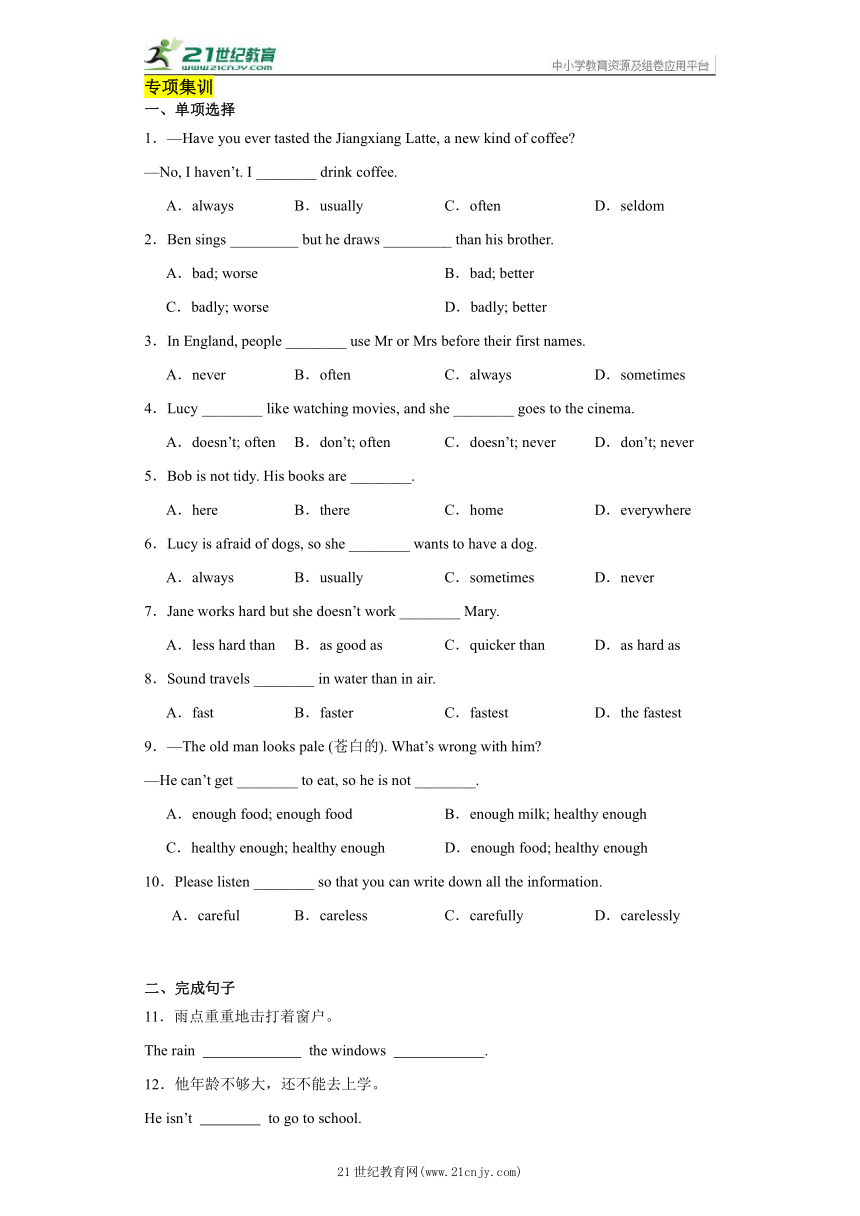副词—语法知识梳理+专项集训及解析【中考英语 冀教版】
文档属性
| 名称 | 副词—语法知识梳理+专项集训及解析【中考英语 冀教版】 |

|
|
| 格式 | docx | ||
| 文件大小 | 47.1KB | ||
| 资源类型 | 试卷 | ||
| 版本资源 | 冀教版 | ||
| 科目 | 英语 | ||
| 更新时间 | 2024-01-29 13:50:21 | ||
图片预览




文档简介
副词
—语法知识梳理 专项集训及解析【中考英语 冀教版】
知识梳理
副词一般放在行为动词或形容词后面,表程度或频率的副词一般放在动词前面。
1. In summer, it always rains heavily .
2. I am very happy to see you today .
3. He works very hard.
4. Frankly, I don't like the way he talks.
总结:副词修饰 1、 动词
形容词
副词
句子
副词的分类
(1) 时间/频率副词:ago, before, already, now, just, soon, then, yet, always, usually, often, sometimes, never, ever等。
(2) 地点副词:here, there, in, out, back, home等。
(3) 程度副词:very, much, only, quite, too, so, nearly, enough, hard, still等。
(4) 疑问副词:when, where, how, why等。
(5) 方式副词:quickly, slowly, carefully, loudly, strongly, badly, happily等。
形容词变副词的变化规则
(1) 直接由形容词加-ly 构成 slow—slowly, strong—strongly
(2)以“辅音字母加le”结尾的词, 改 e 为y simple—simply, gentle—gently, terrible—terribly
(3)以“辅音字母加“y”结尾的词, 改 y 为i 再加-ly easy—easily, happy—happily, busy—busily
(4)其他形式 full—fully, true—truly
(5)既是形容词也是副词 well, fast, slow, hard, high, straight, late, early
副词的特殊形式
(1) hardly 不是 hard 的副词形式。
(2)像副词的形容词:friendly, lonely, lovely, likely, daily, lively, ugly...
(3) well 可作形容词, 意为“健康的,身体好的”;
也可作副词, 意为“好地”
专项集训
一、单项选择
1.—Have you ever tasted the Jiangxiang Latte, a new kind of coffee
—No, I haven’t. I ________ drink coffee.
A.always B.usually C.often D.seldom
2.Ben sings _________ but he draws _________ than his brother.
A.bad; worse B.bad; better
C.badly; worse D.badly; better
3.In England, people ________ use Mr or Mrs before their first names.
A.never B.often C.always D.sometimes
4.Lucy ________ like watching movies, and she ________ goes to the cinema.
A.doesn’t; often B.don’t; often C.doesn’t; never D.don’t; never
5.Bob is not tidy. His books are ________.
A.here B.there C.home D.everywhere
6.Lucy is afraid of dogs, so she ________ wants to have a dog.
A.always B.usually C.sometimes D.never
7.Jane works hard but she doesn’t work ________ Mary.
A.less hard than B.as good as C.quicker than D.as hard as
8.Sound travels ________ in water than in air.
A.fast B.faster C.fastest D.the fastest
9.—The old man looks pale (苍白的). What’s wrong with him
—He can’t get ________ to eat, so he is not ________.
A.enough food; enough food B.enough milk; healthy enough
C.healthy enough; healthy enough D.enough food; healthy enough
10.Please listen ________ so that you can write down all the information.
A.careful B.careless C.carefully D.carelessly
二、完成句子
11.雨点重重地击打着窗户。
The rain the windows .
12.他年龄不够大,还不能去上学。
He isn’t to go to school.
13.初中毕业之后你会最想念哪位老师呢?(完成译句)
Which teacher will you after finishing your middle school
14.人无完人。我偶尔也会犯错。
Nobody is perfect. I also make a mistake .
15.地震突然发生,但幸运的是多数村民们被带到了安全地带。
The earthquake happened , but luckily the villagers were brought to a safe place.
16.they, games, happily, are, playing
.
17.the, farthest, he, lives, school, from (.)
.
18.often, the, she, goes, cinema, to
.
19.下过雪后,到处都是白色的。(汉译英)
It is after it snows.
20.we, about, our, own, plans, think, carefully
.
三、单词拼写
21.My cousin Peter was walking his dog in the neighborhood when it began to rain heavily. (sudden)
22.It is unbelievable that many things were invented (偶然;意外地).
23.Don’t go there (独自). Let me go with you.
24.Asking the questions sounds rude. You need to start with “Excuse me”. (direct)
25.I’m sorry to tell that I’m (完全) new to this kind of work.
26.Now lots of e-books are w read.
27.We should speak as (polite) as possible when we ask strangers for help.
28.What can we do n (下一步)
29.The Spring Festival Gala is usually covered l to the whole world on TV.
30.Mr. Smith wanted to travel (wide) to know more about the world.
21世纪教育网(www.21cnjy.com)
21世纪教育网(www.21cnjy.com)
参考答案:
1.D
【详解】句意:——你尝过“酱香拿铁”这种新咖啡吗?——不,我没有。我很少喝咖啡。
考查副词辨析。always总是;usually通常;often经常;seldom很少。根据所给空前面的“No, I haven’t.”可知,应该是很少喝咖啡。故选D。
2.D
【详解】句意:本唱得不好,但他画得比他哥哥好。
考查副词以及比较级。bad差的,形容词;badly差地,副词;worse更差;better更好。第一空修饰动词sing,应填副词badly。but前半句说唱得不好,but表示转折,后面应说画得更好,故选D。
3.A
【详解】句意:在英国,人们从不在名字前加上Mr或Mrs。
考查常识以及频率副词。never从不;often经常;always总是;sometimes有时。根据“In England, people …use Mr or Mrs before their first names.”及常识可知,英国人从不在名字前加上Mr或Mrs,故选A。
4.C
【详解】句意:露西不喜欢看电影,她从来不去电影院。
考查助动词do和频度副词。doesn’t不,第三人称单数;don’t不,原形;often经常;never从不。主语Lucy为第三人称单数,空一用doesn’t;根据“Lucy doesn't like watching movies”可推断从不去电影院,空二用never。故选C。
5.D
【详解】句意:鲍勃不整洁。他的书到处都是。
考查副词辨析。here这里;there那里;home家;everywhere到处。根据“Bob is not tidy”可知,说明书到处都是。故选D。
6.D
【详解】句意:露西害怕狗,所以她从来不想养狗。
考查频度副词辨析。always总是;usually通常;sometimes有时;never从不。根据“Lucy is afraid of dogs,”可知,露西害怕狗,所以从不想养狗。故选D。
7.D
【详解】句意:简工作很努力,但不如玛丽努力。
考查副词原级。less hard than不如……努力,比较级;as good as像……一样好,形容词;quicker than比……快,形容词;as hard as像……一样努力,副词。分析句子可知,横线上是副词修饰动词work,排除BC,由“Jane works hard but she doesn’t work”可知,表述的是不如玛丽,由于横线前有否定词,所以是as hard as。故选D。
8.B
【详解】句意:声音在水中比在空气中传播得快。
考查形副三级辨析。fast快地(原级);faster更快地(比较级);(the) fastest最快地(最高级)。根据句中“than”,可知空处应填副词比较级。故选B。
9.D
【详解】句意:——老人脸色苍白。他怎么了?——他无法获得足够的食物,所以他不够健康。
考查形容词作定语和副词修饰形容词。food食物,表示“吃”时搭配动词have或eat;milk牛奶,表示“喝”时搭配动词have或drink。enough修饰名词时,位于名词前;enough修饰形容词或副词时,位于其后。根据“to eat”可知排除选项B和C;根据“he is not”可知后接形容词作表语,healthy为形容词,因此enough位于其后。故选D。
10.C
【详解】句意:请仔细听以便记下所有的信息。
考查形容词和副词词义辨析。careful仔细的,形容词;careless粗心的,形容词;carefully仔细地,副词;carelessly粗心地,副词。根据“so that you can write down all the information.”可知,空处应表达仔细地听,修饰动词listen用副词形式。故选C。
11. beat heavily/hard
【详解】根据语境可知,可以使用一般过去时或者现在进行时,即谓语动词用beat的过去式(beat)或者is beating,结合一空一词,故用一般过去时;“重重地”修饰“敲打”,故用副词,“heavily”和“hard”符合题意。故填beat;heavily/hard。
12.old enough
【详解】根据汉语提示可知,表示“年龄足够大”要用old enough,enough修饰形容词或副词时要后置,由enough形成的句型结构为:形容词/副词+enough to do sth“做某事足够……”。故填old enough。
13.miss most
【详解】根据中英文对照可知,空处缺少了“最想念”,miss“想念”,助动词will后面加动词原形,most“最……”, 副词最高级。故填miss most。
14.once in a while/now and then/occasionally
【详解】根据中英文对照可知,英文句子缺少“偶尔”,英文表达是once in a while、now and then或者occasionally,故填once in a while/now and then/occasionally。
15.all of a sudden/suddenly
【详解】“突然”可用副词词组all of a sudden或副词suddenly,修饰动词happened。故填all of a sudden/suddenly。
16.They are playing games happily
【详解】根据标点符号“.”可知该句为陈述句。分析所给词汇可知,they“他们”作主语,are playing为谓语动词,时态为现在进行时;games“游戏”作宾语;副词happily“快乐地”修饰动词。故答案为They are playing games happily“他们正在快乐地玩游戏”。
17.He lives the farthest from school/He lives farthest from the school
【详解】根据所给词及标点可知,此句为陈述句;he作主语,位于句首首字母需大写;lives作谓语;(the) farthest为副词最高级形式,作状语;from (the) school介词短语作状语。故填He lives the farthest from school/He lives farthest from the school“他住的离学校最远”。
18.She often goes to the cinema
【详解】根据单词和标点提示可知,句子为一般现在时的陈述句;分析单词,she作主语,置于句首,首字母要大写;频度副词often在句中作状语,一般置于be动词、情态动词、助动词之后,实义动词之前;goes to作谓语;the cinema作宾语。故填She often goes to the cinema“她经常去看电影”。
19. white everywhere
【详解】white“白色的”,形容词作表语;everywhere“到处”,地点副词。故填white;everywhere。
20.We think carefully about our own plans
【详解】根据分析所给单词可知应用陈述句的形式。其中we作主语;think about作谓语;副词carefully修饰think about;our own plan作宾语。故填We think carefully about our own plans“我们仔细考虑我们自己的计划”。
21.suddenly
【详解】句意:我表哥彼得正在附近遛狗,突然下起了大雨。根据“it began to rain heavily.”可知,此处修饰整个句子,应用副词形式suddenly“突然”。故填suddenly。
22.by accident/by chance/accidentally
【详解】句意:令人难以置信的是,许多东西都是偶然发明的。介词短语by accident/by chance,以及副词accidentally,都表示“偶然,意外地”,在句中作状语。故填by accident/by chance/accidentally。
23.alone
【详解】句意:不要一个人去。让我和你一起去吧。alone“独自”,副词修饰动词。故填alone。
24.directly
【详解】句意:直接问问题听起来很粗鲁,你应该从“打扰一下”开始。根据“sounds ”,结合所给提示词可知,此处应该用副词修饰动词,所以把形容词direct变成副词形式directly,意为“直接地”符合题意。故填directly。
25.completely
【详解】句意:我很抱歉地告诉你,我对这种工作完全生疏。空处修饰形容词new,所以用副词;“完全(地)”completely,副词。故填completely。
26.(w)idely
【详解】句意:现在很多电子书被广泛阅读。根据“Now lots of e-books are…read.”和首字母提示可知,许多电子书被广泛阅读。widely意为“广泛地”,副词修饰动词read。故填(w)idely。
27.politely
【详解】句意:当我们向陌生人求助时,我们应该尽可能礼貌地说话。polite“礼貌的”,形容词;此处用来修饰动词speak,应该用副词politely“礼貌地”,as...as中间用形容词或副词原级。故填politely。
28.(n)ext
【详解】句意:我们下一步能做什么?根据汉语及首字母提示,应填next“下一步,紧接着”,副词。故填(n)ext。
29.(l)ive
【详解】句意:春节联欢晚会通常在电视上向全世界直播。根据常识和句中“the whole world on TV”可知,此句是说春晚通常在电视上向全世界直播,live副词,意为“现场直播地”,在句中作状语,故填(l)ive。
30.widely
【详解】句意:史密斯先生想广泛旅行以了解世界。wide“广泛的”,形容词。分析句子可知,此处应用副词修饰动词travel。故填widely。
21世纪教育网(www.21cnjy.com)
21世纪教育网(www.21cnjy.com)
—语法知识梳理 专项集训及解析【中考英语 冀教版】
知识梳理
副词一般放在行为动词或形容词后面,表程度或频率的副词一般放在动词前面。
1. In summer, it always rains heavily .
2. I am very happy to see you today .
3. He works very hard.
4. Frankly, I don't like the way he talks.
总结:副词修饰 1、 动词
形容词
副词
句子
副词的分类
(1) 时间/频率副词:ago, before, already, now, just, soon, then, yet, always, usually, often, sometimes, never, ever等。
(2) 地点副词:here, there, in, out, back, home等。
(3) 程度副词:very, much, only, quite, too, so, nearly, enough, hard, still等。
(4) 疑问副词:when, where, how, why等。
(5) 方式副词:quickly, slowly, carefully, loudly, strongly, badly, happily等。
形容词变副词的变化规则
(1) 直接由形容词加-ly 构成 slow—slowly, strong—strongly
(2)以“辅音字母加le”结尾的词, 改 e 为y simple—simply, gentle—gently, terrible—terribly
(3)以“辅音字母加“y”结尾的词, 改 y 为i 再加-ly easy—easily, happy—happily, busy—busily
(4)其他形式 full—fully, true—truly
(5)既是形容词也是副词 well, fast, slow, hard, high, straight, late, early
副词的特殊形式
(1) hardly 不是 hard 的副词形式。
(2)像副词的形容词:friendly, lonely, lovely, likely, daily, lively, ugly...
(3) well 可作形容词, 意为“健康的,身体好的”;
也可作副词, 意为“好地”
专项集训
一、单项选择
1.—Have you ever tasted the Jiangxiang Latte, a new kind of coffee
—No, I haven’t. I ________ drink coffee.
A.always B.usually C.often D.seldom
2.Ben sings _________ but he draws _________ than his brother.
A.bad; worse B.bad; better
C.badly; worse D.badly; better
3.In England, people ________ use Mr or Mrs before their first names.
A.never B.often C.always D.sometimes
4.Lucy ________ like watching movies, and she ________ goes to the cinema.
A.doesn’t; often B.don’t; often C.doesn’t; never D.don’t; never
5.Bob is not tidy. His books are ________.
A.here B.there C.home D.everywhere
6.Lucy is afraid of dogs, so she ________ wants to have a dog.
A.always B.usually C.sometimes D.never
7.Jane works hard but she doesn’t work ________ Mary.
A.less hard than B.as good as C.quicker than D.as hard as
8.Sound travels ________ in water than in air.
A.fast B.faster C.fastest D.the fastest
9.—The old man looks pale (苍白的). What’s wrong with him
—He can’t get ________ to eat, so he is not ________.
A.enough food; enough food B.enough milk; healthy enough
C.healthy enough; healthy enough D.enough food; healthy enough
10.Please listen ________ so that you can write down all the information.
A.careful B.careless C.carefully D.carelessly
二、完成句子
11.雨点重重地击打着窗户。
The rain the windows .
12.他年龄不够大,还不能去上学。
He isn’t to go to school.
13.初中毕业之后你会最想念哪位老师呢?(完成译句)
Which teacher will you after finishing your middle school
14.人无完人。我偶尔也会犯错。
Nobody is perfect. I also make a mistake .
15.地震突然发生,但幸运的是多数村民们被带到了安全地带。
The earthquake happened , but luckily the villagers were brought to a safe place.
16.they, games, happily, are, playing
.
17.the, farthest, he, lives, school, from (.)
.
18.often, the, she, goes, cinema, to
.
19.下过雪后,到处都是白色的。(汉译英)
It is after it snows.
20.we, about, our, own, plans, think, carefully
.
三、单词拼写
21.My cousin Peter was walking his dog in the neighborhood when it began to rain heavily. (sudden)
22.It is unbelievable that many things were invented (偶然;意外地).
23.Don’t go there (独自). Let me go with you.
24.Asking the questions sounds rude. You need to start with “Excuse me”. (direct)
25.I’m sorry to tell that I’m (完全) new to this kind of work.
26.Now lots of e-books are w read.
27.We should speak as (polite) as possible when we ask strangers for help.
28.What can we do n (下一步)
29.The Spring Festival Gala is usually covered l to the whole world on TV.
30.Mr. Smith wanted to travel (wide) to know more about the world.
21世纪教育网(www.21cnjy.com)
21世纪教育网(www.21cnjy.com)
参考答案:
1.D
【详解】句意:——你尝过“酱香拿铁”这种新咖啡吗?——不,我没有。我很少喝咖啡。
考查副词辨析。always总是;usually通常;often经常;seldom很少。根据所给空前面的“No, I haven’t.”可知,应该是很少喝咖啡。故选D。
2.D
【详解】句意:本唱得不好,但他画得比他哥哥好。
考查副词以及比较级。bad差的,形容词;badly差地,副词;worse更差;better更好。第一空修饰动词sing,应填副词badly。but前半句说唱得不好,but表示转折,后面应说画得更好,故选D。
3.A
【详解】句意:在英国,人们从不在名字前加上Mr或Mrs。
考查常识以及频率副词。never从不;often经常;always总是;sometimes有时。根据“In England, people …use Mr or Mrs before their first names.”及常识可知,英国人从不在名字前加上Mr或Mrs,故选A。
4.C
【详解】句意:露西不喜欢看电影,她从来不去电影院。
考查助动词do和频度副词。doesn’t不,第三人称单数;don’t不,原形;often经常;never从不。主语Lucy为第三人称单数,空一用doesn’t;根据“Lucy doesn't like watching movies”可推断从不去电影院,空二用never。故选C。
5.D
【详解】句意:鲍勃不整洁。他的书到处都是。
考查副词辨析。here这里;there那里;home家;everywhere到处。根据“Bob is not tidy”可知,说明书到处都是。故选D。
6.D
【详解】句意:露西害怕狗,所以她从来不想养狗。
考查频度副词辨析。always总是;usually通常;sometimes有时;never从不。根据“Lucy is afraid of dogs,”可知,露西害怕狗,所以从不想养狗。故选D。
7.D
【详解】句意:简工作很努力,但不如玛丽努力。
考查副词原级。less hard than不如……努力,比较级;as good as像……一样好,形容词;quicker than比……快,形容词;as hard as像……一样努力,副词。分析句子可知,横线上是副词修饰动词work,排除BC,由“Jane works hard but she doesn’t work”可知,表述的是不如玛丽,由于横线前有否定词,所以是as hard as。故选D。
8.B
【详解】句意:声音在水中比在空气中传播得快。
考查形副三级辨析。fast快地(原级);faster更快地(比较级);(the) fastest最快地(最高级)。根据句中“than”,可知空处应填副词比较级。故选B。
9.D
【详解】句意:——老人脸色苍白。他怎么了?——他无法获得足够的食物,所以他不够健康。
考查形容词作定语和副词修饰形容词。food食物,表示“吃”时搭配动词have或eat;milk牛奶,表示“喝”时搭配动词have或drink。enough修饰名词时,位于名词前;enough修饰形容词或副词时,位于其后。根据“to eat”可知排除选项B和C;根据“he is not”可知后接形容词作表语,healthy为形容词,因此enough位于其后。故选D。
10.C
【详解】句意:请仔细听以便记下所有的信息。
考查形容词和副词词义辨析。careful仔细的,形容词;careless粗心的,形容词;carefully仔细地,副词;carelessly粗心地,副词。根据“so that you can write down all the information.”可知,空处应表达仔细地听,修饰动词listen用副词形式。故选C。
11. beat heavily/hard
【详解】根据语境可知,可以使用一般过去时或者现在进行时,即谓语动词用beat的过去式(beat)或者is beating,结合一空一词,故用一般过去时;“重重地”修饰“敲打”,故用副词,“heavily”和“hard”符合题意。故填beat;heavily/hard。
12.old enough
【详解】根据汉语提示可知,表示“年龄足够大”要用old enough,enough修饰形容词或副词时要后置,由enough形成的句型结构为:形容词/副词+enough to do sth“做某事足够……”。故填old enough。
13.miss most
【详解】根据中英文对照可知,空处缺少了“最想念”,miss“想念”,助动词will后面加动词原形,most“最……”, 副词最高级。故填miss most。
14.once in a while/now and then/occasionally
【详解】根据中英文对照可知,英文句子缺少“偶尔”,英文表达是once in a while、now and then或者occasionally,故填once in a while/now and then/occasionally。
15.all of a sudden/suddenly
【详解】“突然”可用副词词组all of a sudden或副词suddenly,修饰动词happened。故填all of a sudden/suddenly。
16.They are playing games happily
【详解】根据标点符号“.”可知该句为陈述句。分析所给词汇可知,they“他们”作主语,are playing为谓语动词,时态为现在进行时;games“游戏”作宾语;副词happily“快乐地”修饰动词。故答案为They are playing games happily“他们正在快乐地玩游戏”。
17.He lives the farthest from school/He lives farthest from the school
【详解】根据所给词及标点可知,此句为陈述句;he作主语,位于句首首字母需大写;lives作谓语;(the) farthest为副词最高级形式,作状语;from (the) school介词短语作状语。故填He lives the farthest from school/He lives farthest from the school“他住的离学校最远”。
18.She often goes to the cinema
【详解】根据单词和标点提示可知,句子为一般现在时的陈述句;分析单词,she作主语,置于句首,首字母要大写;频度副词often在句中作状语,一般置于be动词、情态动词、助动词之后,实义动词之前;goes to作谓语;the cinema作宾语。故填She often goes to the cinema“她经常去看电影”。
19. white everywhere
【详解】white“白色的”,形容词作表语;everywhere“到处”,地点副词。故填white;everywhere。
20.We think carefully about our own plans
【详解】根据分析所给单词可知应用陈述句的形式。其中we作主语;think about作谓语;副词carefully修饰think about;our own plan作宾语。故填We think carefully about our own plans“我们仔细考虑我们自己的计划”。
21.suddenly
【详解】句意:我表哥彼得正在附近遛狗,突然下起了大雨。根据“it began to rain heavily.”可知,此处修饰整个句子,应用副词形式suddenly“突然”。故填suddenly。
22.by accident/by chance/accidentally
【详解】句意:令人难以置信的是,许多东西都是偶然发明的。介词短语by accident/by chance,以及副词accidentally,都表示“偶然,意外地”,在句中作状语。故填by accident/by chance/accidentally。
23.alone
【详解】句意:不要一个人去。让我和你一起去吧。alone“独自”,副词修饰动词。故填alone。
24.directly
【详解】句意:直接问问题听起来很粗鲁,你应该从“打扰一下”开始。根据“sounds ”,结合所给提示词可知,此处应该用副词修饰动词,所以把形容词direct变成副词形式directly,意为“直接地”符合题意。故填directly。
25.completely
【详解】句意:我很抱歉地告诉你,我对这种工作完全生疏。空处修饰形容词new,所以用副词;“完全(地)”completely,副词。故填completely。
26.(w)idely
【详解】句意:现在很多电子书被广泛阅读。根据“Now lots of e-books are…read.”和首字母提示可知,许多电子书被广泛阅读。widely意为“广泛地”,副词修饰动词read。故填(w)idely。
27.politely
【详解】句意:当我们向陌生人求助时,我们应该尽可能礼貌地说话。polite“礼貌的”,形容词;此处用来修饰动词speak,应该用副词politely“礼貌地”,as...as中间用形容词或副词原级。故填politely。
28.(n)ext
【详解】句意:我们下一步能做什么?根据汉语及首字母提示,应填next“下一步,紧接着”,副词。故填(n)ext。
29.(l)ive
【详解】句意:春节联欢晚会通常在电视上向全世界直播。根据常识和句中“the whole world on TV”可知,此句是说春晚通常在电视上向全世界直播,live副词,意为“现场直播地”,在句中作状语,故填(l)ive。
30.widely
【详解】句意:史密斯先生想广泛旅行以了解世界。wide“广泛的”,形容词。分析句子可知,此处应用副词修饰动词travel。故填widely。
21世纪教育网(www.21cnjy.com)
21世纪教育网(www.21cnjy.com)
同课章节目录
- 词法
- 名词
- 动词和动词短语
- 动词语态
- 动词时态
- 助动词和情态动词
- 非谓语动词
- 冠词
- 代词
- 数词和量词
- 形容词副词及其比较等级
- 介词和介词短语
- 连词和感叹词
- 构词法
- 相似、相近词比较
- 句法
- 陈述句
- 一般疑问句和否定疑问句
- 特殊疑问句及选择疑问句
- 反意疑问句
- 存在句(There be句型)
- 宾语从句
- 定语从句
- 状语从句
- 主谓一致问题
- 简单句
- 并列句
- 复合句
- 主谓一致
- 主、表语从句
- 名词性从句
- 直接引语和间接引语
- 虚拟语气
- 感叹句
- 强调句
- 倒装句
- 祈使句
- 句子的成分
- 句子的分类
- 题型专区
- 单项选择部分
- 易错题
- 完形填空
- 阅读理解
- 词汇练习
- 听说训练
- 句型转换
- 补全对话
- 短文改错
- 翻译
- 书面表达
- 任务型阅读
- 语法填空
- 其他资料
